
Efforts to avail smallholder farmers in Nigeria with transgenic maize variety that combines drought tolerance, insect resistance, and other important yield and disease resistance traits to enhance food security has started yielding positive results.
Scientists at the Institute for Agricultural Research, Ahmadu Bello University, Zaria in collaboration with African Agricultural Technology Foundation have completed confined field trials of TELA maize, a genetically modified maize variety that is resistant to the deadly fall armyworm, stem borer, and drought.
Maize is an important food crops consumed by over 300 million people in Sub-Saharan Africa (SSA); and in Nigeria, maize is the 4th most consumed cereal after sorghum, millet, and rice.
Maize contributes to food and nutrition security, accounting for 20 per cent of calories and 16 per cent of national protein needs. It is the most widely grown cereal crop in all agro-ecologies in Nigeria covering 6.0 million hectares with national productivity at 1.6 tons per hectare.
But since the advent of FAW in 2016 in Nigeria and the rising incidents of drought due to climatic change, the productivity of this all-important crop has nosedived and negatively impacted maize production across Nigeria.
The impact of FAW is felt by more than a million maize producer households across Nigeria, resulting in more than 268 million dollars worth of losses in earnings in just four states, Abia, Ekiti, Ondo and Oyo states, as of November 2017.
After years of research, scientists at IAR have been able to overcome the worm and have gone a step further to address the twin- challenge of insect pests and drought in maize production, by developing stacked GM maize that combines drought tolerance and insect protection traits for Nigeria.
Speaking during the public presentation of the research works, Prof. Ishiyaku Mohammed, Executive Director, IAR said that the TELA Maize variety gave on average 19 per cent yield advantage relative to non-GM, isogenic hybrids, and 40 per cent higher yield than the commercial checks under the infestation of stem borer and FAW.
Under optimum moisture with protection against the target pests, the GM variety gave a similar yield as the non-GM, isogenic hybrids. The non-significant difference of 0.6 tons per hectare of GM over non-GM, isogenic hybrids, was possibly due to their superiority and because of incomplete protection from the use of chemical insecticide against the target pests (especially the fall armyworm) among the non-GM hybrids.
On average, commercial checks had 1.1 to 1.7 tons per hectare lower yield than the test hybrids (GM and isogenic, non-GM hybrids) under optimum condition, indicating that they are likely to have much lower yield potential than the test hybrids, in addition to the incomplete protection from the use of insecticides against the target pests.
Prof. Rabiu Adamu, Principal Investigator for the TELA Maize project noted that TELA Maize hybrids will tremendously reduce the use of Insecticides to manage the recalcitrant pests of Maize this will greatly improve farmers yields and income Nigerian farmers which impact positively on the food and Nutritional Security of Nigerians.
Dr Sylvester Oikeh, TELA Maize Project Manager from AATF said maize farmers will benefit greatly from the approval by the National Biosafety Management Agency (NBMA) for the TELA Maize hybrids to be tested with farmers for commercial release because farmers who spend over 50,000 Naira per acre every season to protect their maize against these pests will be relieved.
The public presentation is one of the requirements of the NBMA that allows the public to have a say in the research process before it is deregulated and allowed to be planted across Nigeria in national performance trials with farmers, prior to being commercially released as a variety for production in Nigeria.



















































































